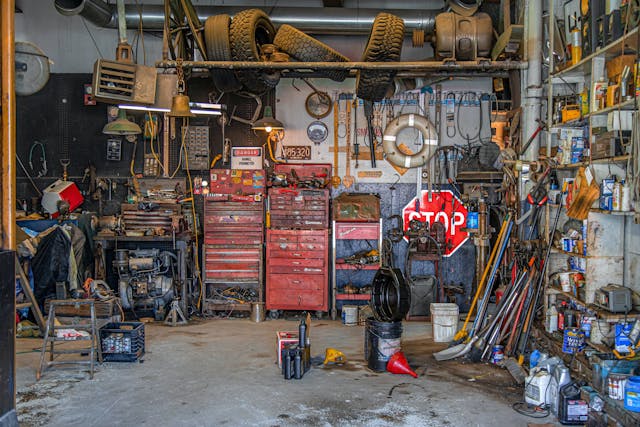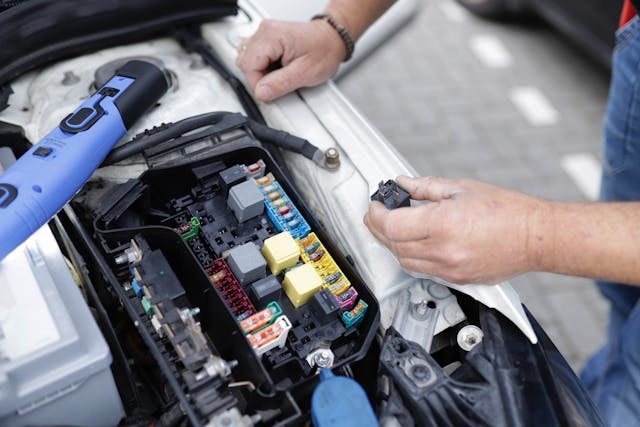Right to Repair made strides in ’23, but the movement has far to go
It’s been a big year for Right to Repair. Starting with John Deere signing a memorandum of understanding (MOU) in January that allows farmers and independent repair shops to perform maintenance on their own tractors, 2023 has provided multiple victories on behalf of consumers. Some of those wins are directly related to the automotive industry.
According to the National Conference of State Legislatures, 33 states and Puerto Rico considered Right to Repair legislation during the 2023 legislative session. Maine became the fifth state in 11 months to approve Right to Repair legislation, when 84 percent of voters said yes to the question, “Should auto manufacturers enable owners and their preferred mechanics to access their car’s diagnostics systems?” Other states to pass similar laws in 2023 are:
- Colorado, which now “requires agricultural equipment manufacturers to provide resources for individuals to repair their own agricultural equipment”;
- California, which “requires manufacturers [of electronic or appliance products, with some exclusions*] to provide the means to diagnose, maintain, or repair for seven years for products with a price point more than $100 and three years for products under $100”;
- New York, which “requires manufacturers [excluding makers of cars and farm equipment, among others**] to provide consumers with parts or tools for electronic equipment manufactured for the first time and sold or used in New York after July 1, 2023”; and
- Minnesota, which enacted the Digital Fair Repair Act, which requires “manufacturers of certain electronic products to make documentation, parts, and tools for diagnosis, maintenance, or repair available to independent repair providers and product owners on fair and reasonable terms.”
In a nutshell, the Right to Repair fight comes down to this: Consumers want the right to work on their own cars, farm machinery, and electronics. Manufacturers, of course, would rather keep the required computer codes and specialized tools to themselves, citing trademark issues and trade secrets.

Gay Gordon-Byrne, executive director of The Repair Association, says that not allowing consumers the right or resources to repair their own electronics seems illogical.
“When people hear about the right to repair, they say, ‘Oh my God, my dishwasher was broken and I couldn’t get it fixed. My cell phone was broken and it cost me an arm and a leg,’” Gay Gordon-Byrne says. “And it’s very popular from that standpoint because everybody needs to get their stuff fixed.”
However, the idea that “I own it, therefore I should be able to fix it” isn’t popular among manufacturers—and some in the media—who are concerned that sharing proprietary information could affect safety, efficiency, and incentive to innovate. Regardless, Right to Repair advocates remain steadfast.
“It’s pretty incredible the array of people coming out to support (Right to Repair) …” says Allison Conwell, an advocate for Colorado Public Interest Research Group (CoPIRG). “But it’s pretty clear that this is going to take a big effort when you look at who’s across the table.”
Specific to automobiles, the first of many attempts to establish the right to repair arrived in 2001, when the Motor Vehicle Owners’ Right to Repair Act was introduced in the United States Congress. However, the bill went nowhere. Eleven years later, in 2012, Massachusetts voters approved a Right to Repair proposal that “required vehicle owners and independent repair facilities in Massachusetts to have access to the same vehicle diagnostic and repair information made available to the manufacturers’ Massachusetts dealers and authorized repair facilities.” The law was then used as a starting draft to create similar legislation in other states.

Three years ago, in November 2020, Massachusetts voters overwhelmingly approved a measure that expanded the rights of do-it-yourselfers and independent mechanics, allowing them access not only to mechanical information but also to wirelessly transmitted information such as telematics, driving, and diagnostics data. Automakers almost immediately filed suit to stop the measure, claiming the law was “unenforceable because it is unconstitutional.” While the case is still working its way through the courts, in August 2023 the National Highway Traffic Safety Administration (NHTSA) instructed Massachusetts authorities to begin enforcing the Right to Repair law—just months after the same agency told automakers to ignore it.
Of the 74 Right to Repair legislation proposals introduced in 2023, most either failed or remain pending. Of those that specifically mention “motor vehicles,” two failed (in Maryland and Montana), and two are pending (in Hawaii and New York).
While Right to Repair advocates applaud victories in Massachusetts, Colorado, California, New York, Minnesota, and Maine in the last three years, they also admit they have a long way to go. For now, those six states will provide a litmus test that will be closely watched by legislators in the other 44. Stay tuned.
* Agricultural, forestry, industrial, or construction industry equipment; video game consoles; and alarm systems, like fire alarms are all excluded from California’s 2023 Right to Repair legislation.
** As reported by the New York National Law Review, home appliances that have a “digital electronic product embedded within,” medical devices, motor vehicle manufacturers, and farm and utility tractors and off-road equipment are all excluded from New York’s Right to Repair law.
***
Check out the Hagerty Media homepage so you don’t miss a single story, or better yet, bookmark it. To get our best stories delivered right to your inbox, subscribe to our newsletters.



The right to repair act is just one of several things we need to support. The Cars Act just passed the House and needs support to preventing another 67% increase in average CAFE before 2037 and force EV products on us before they are ready or affordable.
We all need to pay attention to these things that are being forced on us before they are ready for general wide acceptance.
I have nothing against EV products but until they can find their own way in the market on equal footing price and usability wise they should not be forced on the market.
Let them grow as they grow in ability and affordability.
The 1924 Ford Model T could get 24 mpg imp at 24 mph, exactly 100 years ago. Who would have thought that 100 years later, the world would tolerate the production of motor vehicles that could not significantly improve upon the fuel mileage of vehicles over such a long period, even advocate for legislation to enshrine this lethargy. John Paul Getty must be howling with laughter in his grave at the thought of the world’s current confusion with the special interest agenda of anti-science/anti-progress denying any improvement in the human existence.
Don,
With all due respect, I don’t think you can compare the fuel economy of a Model T to a modern average car that is much heavier due to all of the technology and SAFETY equipment that is present. If you want to make that argument then we should all be riding motorcycles that get 60+ mpg while doing 90mph. As hyperv6 pointed out, most people have nothing against EVs IF they can provide the same service at roughly the same cost. Which many can’t at this point. Many companies (GM,Toyota) have started to realize that when considering the full environmental harm done by the mining and production of the rare (and sometimes toxic) elements used to created EV batteries, the ICE car is actually much “Greener” over its usable lifecycle. The point I’m trying to make is that “special interest agendas” exist in the EV sector as well and to say there has been no progress in the ICE field is to be frank a little ignorant. When the market decides EVs are the better value, the government won’t have to force anyone to buy them.
Agreed. Plenty more to be done.
First they take your Freedom, then they take your tools.
Your wife?
If farm equipment, construction equipment, etc are excluded then the main problem has not been solved. Those people still have the same problem. But it makes the general public think the problem is solved. Amazing!
Without the right to repair I will never buy another new vehicle. I can always ride my horse 🐎.
What about Right To Repair in Canada? I’ve come up against this in recent years with Honda / Acura. They used to make special tools unique to their vehicles available for purchase through dealer parts counters. In particular, my two newest Honda / Acura vehicles need a special tool to be shifted into neutral if the engine can’t be started when the vehicle must be towed or pulled onto a flatbed. Honda / Acura dealer parts managers now say that they are not permitted to sell the required special tools to customers.
Right to Repair is an ideal solution to forcing consumers to work only with dealers, but with the electronic tech expansion in all vehicles it will be more difficult for most people to understand, much less solve, a lot of repair needs. I just bought a 2024 RAV4 Hybrid and it has me baffled just trying to get used to all the various technical tools to operate it. Repairing it later on will not be easy without involving the trained dealer’s mechanics.
It’s a pretty sad, dark world that we have allowed to develope. Cars have become too much of a nightmare to diagnose with all this fool infected high tech junk under the hood and then to top it off we have to fight the manufacturers to retain the ability to repair what little is left. I bought my only new vehicle 43 years ago that still had a carburetor and points ignition because I knew it would be EASILY repaired. There is only a slight increase on time spent working on it but no time spent wondering how to repair it. The vehicles I own that I do have to work on are these so called newer ones that so many say “never cause any trouble”. Check engine light this and check engine light that. My collector cars are far less hassle with only slightly more time working on them. Too bad people buy these new vehicles because there is a trickle down effect where those of us who need to budget our spending end up buying used fool infected vehicles that repairs are hard to afford and/or do. I am in the process of restoring another collector car that I will drive every day and get rid of the newer ones with their fuel pumps in the gas tank, etc. Simpler is cheaper and better.
Well, that was probably the Only worthwhile piece of legislation that Minnesota passed this past year!
I am an absolute supporter of Right to Repair, without exception. Don’t buy anything you can’t fix.